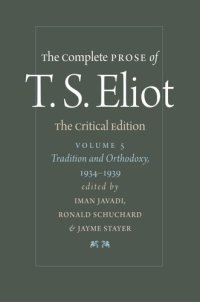
Ebook: The Complete Prose of T.S. Eliot - Volume 5: Tradition and Orthodoxy, 1934-1939
- Year: 2017
- Publisher: Johns Hopkins University Press
- City: Baltimore
- Language: English
- pdf
Volume 5 of The Complete Prose of T. S. Eliot covers the years 1934–1939. Subtitled Tradition and Orthodoxy, the volume documents Eliot’s engagements with the many social crises that dominated the 1930s.
The abstractions of political theory and the claims of Christian theology were the two disciplines by which Eliot steered his way through the political and economic problems of the decade. The lingering effects of the Great Depression and the consequent rise of extremist political ideologies in the early 1930s gave rise to Eliot’s reflections on the failures of capitalism and liberal democracy in addressing these problems. The popularity of, and problems with, fascism and communism provided Eliot with numerous opportunities to reject both options and to sketch instead ways in which traditional culture and orthodox Christianity could provide principles, if not practical ideas, for reweaving the disintegrating fabric of culture. The arts and literature are continuing themes in this volume, though now they are considered in their social totalities, including culture and religion.
Eliot’s controversial and speculative lectures—given in Virginia in 1933, and published the next year as After Strange Gods—are republished in this volume for the first time since 1934. Here, he attempts to interpret aesthetic and artistic concerns in a broader moral frame that includes sociological and theological themes. Throughout the volume, Eliot is engrossed in the emerging field of Christian sociology, which considers how Christian cultures operate and are structured. The arc of this period begins in the stark moralizing of After Strange Gods and ends in the more generous vision of The Idea of a Christian Society, written as Europe moved inexorably toward another total war.
There are eight pieces published in this volume for the first time, including two lectures on Christianity, “The Church as an Ecumenical Society” and “The Christian in the Modern World,” a short radio broadcast, and two major literary lectures, “Tradition and the Practice of Poetry” and the two talks gathered here as “The Development of Shakespeare’s Verse.” There are a further fifteen items that had been previously published but were unrecorded in the Gallup bibliography, plus another eight signed letters and documents with multiple authorship, also unrecorded in Gallup. Here are reproduced, with full textual notes and annotations, all of the books, articles, commentaries, radio broadcasts, lectures, letters to the editor, and other prose forms in which Eliot sought to reach broad and diverse audiences on the matters that most compelled his attention in this tumultuous decade.
The abstractions of political theory and the claims of Christian theology were the two disciplines by which Eliot steered his way through the political and economic problems of the decade. The lingering effects of the Great Depression and the consequent rise of extremist political ideologies in the early 1930s gave rise to Eliot’s reflections on the failures of capitalism and liberal democracy in addressing these problems. The popularity of, and problems with, fascism and communism provided Eliot with numerous opportunities to reject both options and to sketch instead ways in which traditional culture and orthodox Christianity could provide principles, if not practical ideas, for reweaving the disintegrating fabric of culture. The arts and literature are continuing themes in this volume, though now they are considered in their social totalities, including culture and religion.
Eliot’s controversial and speculative lectures—given in Virginia in 1933, and published the next year as After Strange Gods—are republished in this volume for the first time since 1934. Here, he attempts to interpret aesthetic and artistic concerns in a broader moral frame that includes sociological and theological themes. Throughout the volume, Eliot is engrossed in the emerging field of Christian sociology, which considers how Christian cultures operate and are structured. The arc of this period begins in the stark moralizing of After Strange Gods and ends in the more generous vision of The Idea of a Christian Society, written as Europe moved inexorably toward another total war.
There are eight pieces published in this volume for the first time, including two lectures on Christianity, “The Church as an Ecumenical Society” and “The Christian in the Modern World,” a short radio broadcast, and two major literary lectures, “Tradition and the Practice of Poetry” and the two talks gathered here as “The Development of Shakespeare’s Verse.” There are a further fifteen items that had been previously published but were unrecorded in the Gallup bibliography, plus another eight signed letters and documents with multiple authorship, also unrecorded in Gallup. Here are reproduced, with full textual notes and annotations, all of the books, articles, commentaries, radio broadcasts, lectures, letters to the editor, and other prose forms in which Eliot sought to reach broad and diverse audiences on the matters that most compelled his attention in this tumultuous decade.
Download the book The Complete Prose of T.S. Eliot - Volume 5: Tradition and Orthodoxy, 1934-1939 for free or read online
Continue reading on any device:

Last viewed books
Related books
{related-news}
Comments (0)